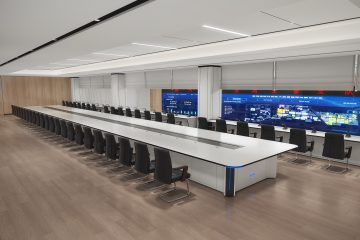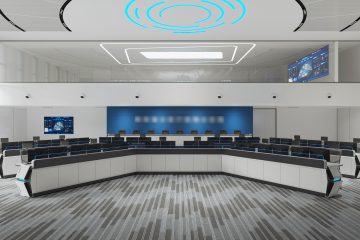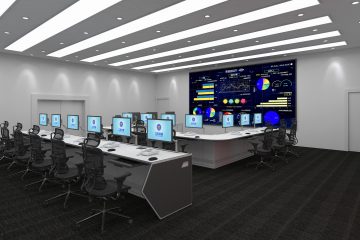Click me to visit our new website

In the modern chemical industry, the control panel serves as a central tool in automated control systems, widely used for monitoring and managing production processes. Through the control panel, chemical enterprises can achieve real-time monitoring and operation of complex chemical reactions, equipment status, and safety parameters, thus improving production efficiency, ensuring safe operations, and reducing environmental impact. This article will explore the specific applications and significance of control panels in the chemical industry.
Ⅰ. Basic Concept of Control Panels
A control panel is an integrated system of hardware, software, and a human-machine interface (HMI), used for monitoring and managing industrial production processes. It typically consists of displays, buttons, switches, and alarm devices, which connect to sensors, actuators, and controllers to enable real-time monitoring, data collection, and remote control of the production process. Modern chemical plants primarily rely on distributed control systems (DCS) or programmable logic controllers (PLC) to operate, making the entire production system more intelligent, automated, and efficient.
Ⅱ. Main Applications of Control Panels in the Chemical Industry
1. Automated Control of Production Processes
In chemical production, chemical reactions are often complex and irreversible, with critical reaction conditions such as temperature, pressure, flow rate, and concentration playing a vital role in product quality and production safety. Through the control panel, operators can monitor these key parameters in real-time and make automatic or manual adjustments when necessary. For example, in oil refining, the cracking reaction requires specific temperature and pressure conditions, and the control panel, via a feedback control system, ensures that these conditions are maintained within optimal ranges, thereby improving both yield and product quality.
2. Monitoring Equipment Status and Fault Diagnosis
Chemical production equipment, such as reactors, pumps, compressors, and heat exchangers, often operates in high-temperature, high-pressure, and corrosive environments, making equipment status monitoring crucial. With control panels, companies can track equipment conditions in real-time, including key parameters like vibration, temperature, and pressure. If abnormalities occur, the control panel will issue an alarm, alerting operators to take immediate action, effectively preventing shutdowns or accidents due to equipment failure. Additionally, control panels can assist operators in performing preventive maintenance through historical data analysis, extending equipment lifespan.
3. Safety and Environmental Monitoring
The chemical production process involves many flammable, explosive, toxic, or corrosive substances, making safety management a top priority. Control panels can monitor the operation of safety systems in real-time, such as fire detection systems, gas leak alarms, and emergency shutdown devices. If an abnormal situation arises, the system automatically initiates emergency responses, such as shutting off valves, activating fire suppression, or starting ventilation systems, ensuring production safety. Moreover, the control panel can monitor environmental parameters like emissions of waste gases, wastewater, and noise, ensuring that the plant complies with environmental regulations and reduces its environmental footprint.
4. Remote Monitoring and Data Integration
With the development of industrial IoT (Internet of Things) and cloud computing, modern control panels allow for remote monitoring and operation. By integrating advanced technologies like cloud computing and big data analytics, operators can monitor production not only from the control room but also through mobile devices or remote control centers, viewing the status of various production stages in real-time and even performing remote operations. This provides greater flexibility for chemical enterprises, especially in multi-plant collaboration and cross-regional management, significantly enhancing management efficiency.
Ⅲ. Impact of Control Panels on Chemical Production
1. Improved Production Efficiency
Control panels enable automation and intelligent production in chemical enterprises, reducing manual intervention and operational errors, thus enhancing production efficiency. Precise control systems ensure that chemical reactions occur under optimal conditions, minimizing resource waste and maximizing output.
2. Ensuring Production Safety
Through real-time monitoring and automatic alarm systems, control panels effectively reduce the risk of safety accidents caused by human factors. Particularly in the production and storage of hazardous chemicals, control panels can quickly respond to emergencies, reducing potential safety hazards.
3. Reducing Environmental Pollution
By monitoring emissions, control panels ensure that plants adhere to environmental regulations, minimizing pollution to the air, water, and soil. Moreover, optimized process control can reduce raw material consumption and energy loss, further lessening the environmental burden.
4. Optimizing Resource Allocation
By analyzing and optimizing production data, control panels help enterprises develop more reasonable production plans and resource allocation strategies. Enterprises can dynamically adjust their production strategies based on real-time production conditions, avoiding overproduction or raw material waste.
Ⅳ. Future Trends in Control Panel Technology
With the rapid development of information technology, control panel technology continues to evolve, and its applications in the chemical industry will become even more widespread and advanced. The following are some key future trends:
1. Intelligent Control
Future control panels will be more intelligent, capable of using artificial intelligence (AI) and machine learning algorithms to autonomously analyze production data, optimize production parameters, predict equipment failures, and even automatically adjust production processes.
2. Application of Virtual Reality and Augmented Reality (VR/AR)
VR/AR technology can be integrated with control panels to provide more intuitive interfaces and training tools. Operators can use VR/AR devices to simulate production environments for training or monitor complex equipment operations in real time.
3. Deeper Integration of IoT
By combining IoT with control panels, chemical companies can achieve comprehensive interconnection of equipment and data sharing, building highly integrated intelligent factories. The interoperability and data flow between devices will enable better real-time monitoring and collaborative operations.
4. Big Data and Cloud Computing
The application of big data analytics and cloud computing will allow control systems to handle large and complex production data, helping enterprises make more precise production decisions and optimization strategies.
As a vital tool in modern chemical production, control panels enhance production efficiency, improve equipment maintenance, and ensure safety and environmental compliance through automation, remote control, and intelligent monitoring. With continued technological advancement, control panels will play an even more crucial role in the future of chemical production, driving the industry toward greater intelligence and digitalization. While ensuring production efficiency, control panels also reduce environmental impacts, making chemical production safer, greener, and more sustainable.



0 Comments